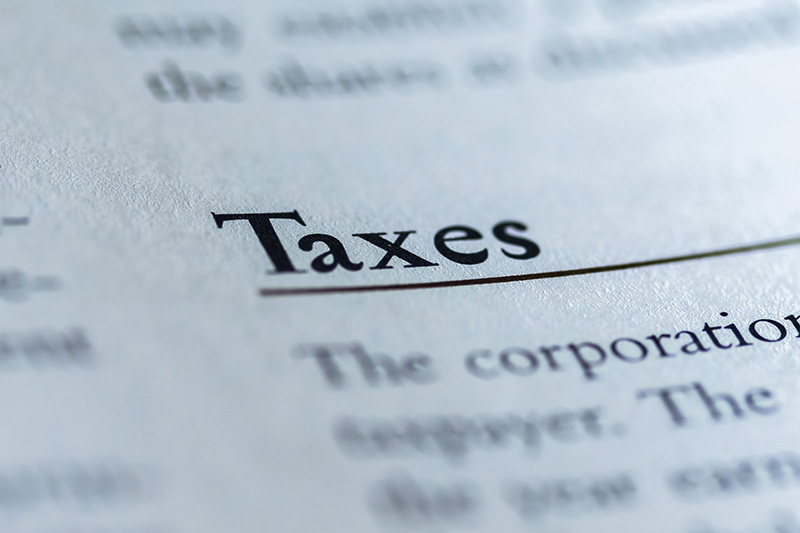RETAIL/ECOMMERCE AND SALES TAX
For decades, companies needed to establish physical presence in a state to establish a taxable presence, or nexus. This meant they needed “boots on the ground” in the form of people or property for a state to require them to collect and remit the state’s taxes (sales tax, income tax, corporate tax, etc.).
However, when the U.S. Supreme Court ruled that states could establish economic nexus in Wayfair v. South Dakota, it meant that legislatures could also require companies with a minimum number of transactions or sales to collect and remit state taxes as well.


What Does This Mean For Retail Sales?
If you sell retail goods across state lines to end consumers, there’s a good chance you’ve established nexus and are responsible for collecting and remitting state tax in most of the states you sell to! While this may sound simple enough, it actually gets complicated very quickly because of a wide variety of factors:
- States define nexus differently. State legislatures haven’t all set their economic nexus thresholds in the same place:
- Some are as low as $100,000 in sales, whereas others are as high as $500,000.
- The transaction threshold (then number of transactions which trigger nexus) are fairly low. Many states have set it at 200 transactions.
- Some require both the transaction and sales thresholds are met, whereas others trigger nexus with just one of the variables being met.
- Some look at the taxable sales, whereas others look at gross sales when determining the dollar threshold.
- Taxability of products varies by state. Items which are taxable in some states, but exempt in others can include medical products, food products, software and SaaS, and certain types of manufacturing equipment, among others.
- Tax rates aren’t standardized. State tax rates change regularly. A retailer selling to two customers in different states, say Texas and Washington, would need to know 1) if those sales trigger nexus, 2) which taxes they’re responsible for collecting, 3) the state tax rate for each sale and 4) any applicable local taxes (for the county, city, etc.).
- Not all states assess the same taxes. In most states, economic nexus only triggers sales tax, however there are legislatures beginning to apply economic nexus to income tax, lease tax, and business and occupation (B&O) tax.
- Some cities require taxes the state doesn’t. Some cities have set up provisions for economic nexus as well. For example, Oregon doesn’t collect a sales tax, but if a retailer establishes nexus in Portland, they are responsible for paying a one percent surcharge on gross revenue from retail sales within the city.
- More states are holding marketplace facilitators responsible for taxes. If the retailer is selling on a marketplace like Amazon or Etsy, most states now require the facilitator (Amazon or Etsy) to collect and remit state tax rather than the seller. And as with economic nexus thresholds, states have introduced various start dates. Anyone selling on sites like these needs to be sure that they’ve considered all the ramifications of not only the marketplace channel, but how sales from their own website may impact their filing results!
- States handle retroactive exposure differently. As retailers are determining if they’ve established economic nexus, some are finding they already had physical presence nexus and didn’t know it. This can be a costly mistake! The good news is this is an area we can help you navigate.
Marketplace Facilitators
A marketplace facilitator (or “MPF”) is a business or organization that contracts with third parties (“sellers”) to sell goods or services on its platform, facilitating the sales that arise (such as Amazon or Etsy). As the name seems to indicate, these companies facilitate sales of goods or services between a seller and a buyer – but generally the MPF does not take title to or even carry the inventory. Following the 2018 South Dakota vs. Wayfair U.S. Supreme Court decision eliminating the physical presence standard for sales tax nexus, most states have in the last 4 years started requiring the marketplace facilitators to collect and remit the sales tax on behalf of the third party sellers. This places a burden on MPFs to be the company which collects and remits and reports the sales tax to the various states in which they’ve established nexus.
However, not all marketplace facilitators are as large as Amazon or Etsy, and in their haste to pass laws to incorporate filing requirements on marketplace facilitators, many states didn’t give much consideration to businesses that might be outside the “norm” of simply facilitating the sale of tangible property on the marketplace.
Because of the complexity that arises for such marketplace facilitators, we often share articles detailing the most up-to-date issues. You can read some of our past articles here and here. Today, we focus on some unique circumstances that we’ve had with clients in their roles as marketplace facilitators.
Client Example 1: Marketplace Facilitators & Services
The taxation of services already varies state to state, making it complex for multi-state providers to keep up. As you can imagine, adding marketplace facilitation to the mix just further complicates the process. One client we’ve worked with is a company which matches providers of a service with the consumer who need that specific service performed (like home repair, yard work, etc). The marketplace facilitator provides a platform (and payment system) that helps match the need with the service. While this can be a useful system for consumers, it does come with sales tax consequences for the marketplace facilitator. First, if the marketplace facilitator charges any kind of separately stated platform fee, that can be subject to sales tax in many states. Also, many services are subject to sales tax and may require the marketplace facilitator to both understand which services are subject to tax in each of the states in which they create nexus and be able to collect it. Since taxability of services varies from state to state, this can get complicated quickly. A few common services subject to sales tax are: fabrication and installation, catering, and specific types of construction and landscaping.
Client Example 2: Sales Tax Complications For Marketplace Facilitators & Rentals
Another specific situation we’ve seen is a client who is a marketplace facilitator that connects people who own specialty equipment that they make available for rent to people looking to rent such equipment for a short time period. In a state like California where sales tax isn’t required to be collected on the rental stream as long as tax was paid up front on the purchase of the property, it may seem relatively straightforward. But what if the person putting equipment out on the marketplace platform for rent can’t readily prove that they paid sales tax on the original purchase? This is often the reality, especially if the item was originally purchased years ago. In this case, the marketplace facilitator may be required to collect tax on the rental stream. It then becomes more of a question of how to properly document the original payment of tax. Based on our detailed conversations with representatives at the California Department of Tax and Fee Administration (“CDTFA”), they certainly hadn’t considered all of the ramifications of such a fact pattern and the necessary documentation required when the state legislature passed the marketplace facilitation legislation. We’ve been working with our client and the state agencies to get to a good resolution. Also, that’s just California! Other states may treat the rental stream (and documentation thereof) differently.

Client Example 3: Liquor Sales As A Marketplace Facilitator
What happens if a regular online seller of unique gift items becomes, in effect, a marketplace facilitator because it begins to sell the occasional bottle of specialty liquor or wine, which, by their nature are subject to special rules? States generally require a seller of alcoholic beverages to be specially registered with the state’s alcoholic beverage commission. Thus, does the flow of goods through the website constitute a reseller relationship or make the company a marketplace facilitator because it can’t directly sell liquor to an end consumer without a liquor license? We recently had a client with this issue and found that the answer took us in a few different directions.
As you can see, marketplace facilitation and sales tax issues are not always as straightforward as you might think. Sometimes you may not even realize that you are a marketplace facilitator and need to be aware of this legislation.
Do You Need Help With Your Marketplace Facilitation Tax Compliance?
If you find yourself with questions regarding marketplace facilitation or sales tax, please give us a call! We recommend that people new to marketplace facilitation legislation connect with professionals like Miles Consulting Group to make sure they are compliant with the marketplace facilitation legislation in their state from the beginning. We would be happy to help you and clarify any tax issues you are trying to navigate. Contact us today.

Sales for Resale
Many companies sell their products to distributors who then sell to the end user/consumer. In these cases, the most common option to avoid double taxation is for the seller to collect a properly executed resale certificate from the purchaser, in which the purchaser is essentially certifying that it is selling the project to end consumers and will collect any applicable sales tax from those customers.
Resale certificate requirements vary by state. The economic nexus rules and reporting requirements emphasize the need for sellers to maintain the correct supporting documentation in the form of a resale certificate. Our clients find themselves on different sides of these transactions and often need some guidance. We can help with that!











